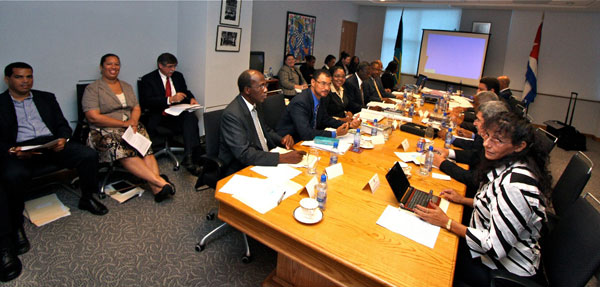
The Bahamas and Cuba resume technical discussion on the delimitation of the maritime boundary between the two countries, at the Ministry of Foreign Affairs on Monday, September 6, 2010. (BIS photo/Kris Ingraham)
|
NASSAU, The Bahamas -- The
Bahamas and the Republic of Cuba officially resumed technical discussions
on the delimitation of the maritime boundary between the two countries,
Monday, September 6, 2010.
Already, two rounds of talks
have been held; the first round of preliminary discussions, which established
the framework for future meetings, was held in Nassau in 2005.
This was followed up by a technical
meeting, which took place in Havana, Cuba on June 12, 2009, when the
Bahamian delegation comprised of senior Bahamian officials with technical
expertise in the area of law of the sea and maritime affairs, met with
Cuban officials.
As was the case at the previous
technical meeting, the Bahamian delegation, which participated in this
third round of discussions included representatives from the Ministry
of Foreign Affairs, the Attorney General’s Office, the Ministry of
the Environment, the Department of Marine Resources, the Royal Bahamas
Defence Force, the Bahamas National Geographic Information Systems Centre,
as well as other senior government officials with expertise and experience
in relevant fields.
“The resumption of discussions
between The Bahamas and Cuba in order to delimit the maritime boundary
between the countries, as required by the United Nations Convention
on Law of the Sea, is a matter of priority,” the Ministry of Foreign
Affairs said.
The official archipelagic baselines
of The Bahamas, which are used to determine the country’s maritime
zones, including its boundary with Cuba, were submitted to the United
Nations by the Government of The Bahamas on December 11, 2008.
“However, these technical
meetings with Cuba are necessary to achieve formal agreement on the
maritime boundary that is in compliance with the international laws
that govern this process,” the Ministry said.
The Ministry explained that
an agreed boundary is vital for the effective management of The Bahamas’
maritime resources and the protection and preservation of the marine
environment.
“Furthermore, from a national
security point of view, reaching an agreement on the maritime boundary
will facilitate the ability of The Bahamas’ security forces to effectively
patrol and protect the maritime borders of The Bahamas,” the Ministry
said.
